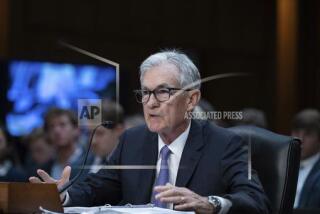China may ease controls on interest rates within two years
China is likely to ease controls on interest rates paid on bank savings within two years and will allow wider use of its tightly controlled currency for trade and investment, the central bank governor said Tuesday.
Zhou Xiaochuan’s comments follow pledges by Chinese leaders to make the country’s slowing economy more productive by giving market forces a “decisive role” in allocating credit and other resources.
Allowing banks to compete for deposits by paying higher rates on savings would put more money in the pockets of Chinese families, helping to achieve official goals of boosting consumer spending and reducing reliance on trade and investment.
“Liberalization of deposit rates, this should be the last step in interest rate marketization,” Zhou said at a news conference. “I personally believe it is very possible to realize this within one to two years.”
Beijing announced its first major reform of interest rates in July, scrapping controls on lending rates. That will allow borrowers with better credit records to negotiate lower rates with banks, reducing costs for healthy businesses and spurring economic growth.
The central banker did not directly answer a question about why Beijing has guided the exchange rate of its yuan lower against in the dollar in recent weeks. But he pointed to the trade balance, which swung to a deficit in February, and said short-term changes in financial markets are normal, while the central bank looks at the longer term.
“We respect market forces,” Zhou said.
The trading band set by the central bank each day for the yuan has drifted down in what analysts say might be an attempt to discourage speculators, who have moved money into China to profit from the currency’s gradual rise over the last few years.
Zhou said the central bank’s plans this year call for allowing more use of the yuan in international trade and investment. The currency does not trade on global markets but increasingly is used by traders in Hong Kong and Southeast Asia in dealings with China. Hong Kong and London have received approval to become offshore centers for trading yuan.
Regulations “will not overly promote the international use of renminbi, but we will create favorable policies to increase people’s confidence,” Zhou said, referring to the currency by its official name. “If you want to use renminbi, we will help to eliminate obstacles.”
More to Read
Inside the business of entertainment
The Wide Shot brings you news, analysis and insights on everything from streaming wars to production — and what it all means for the future.
You may occasionally receive promotional content from the Los Angeles Times.










